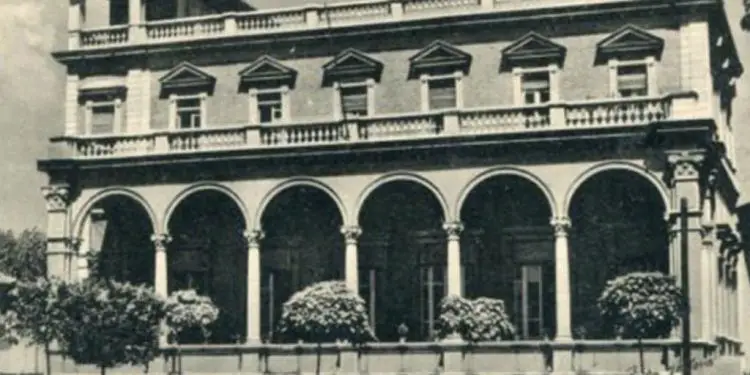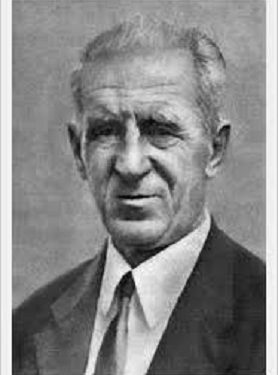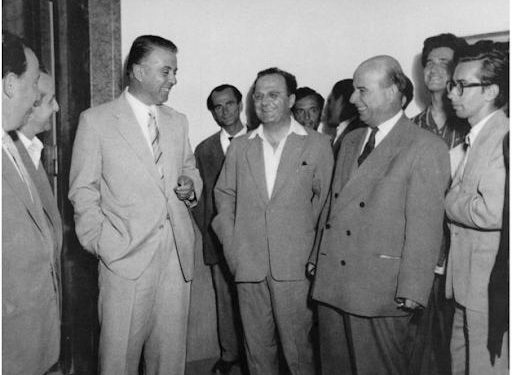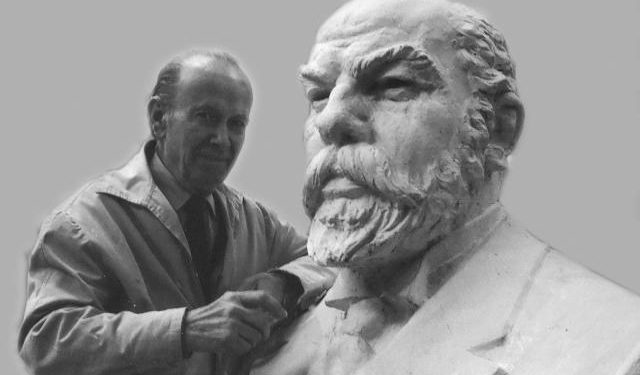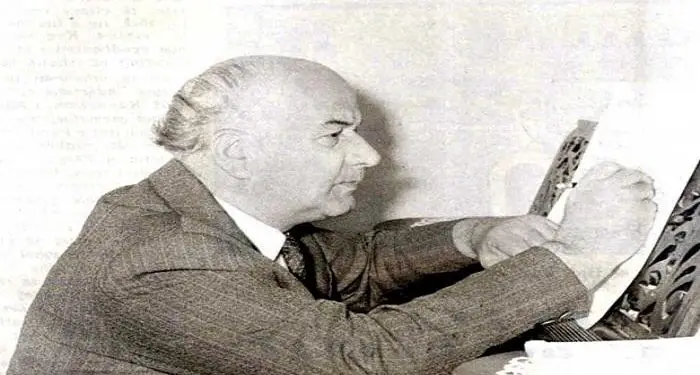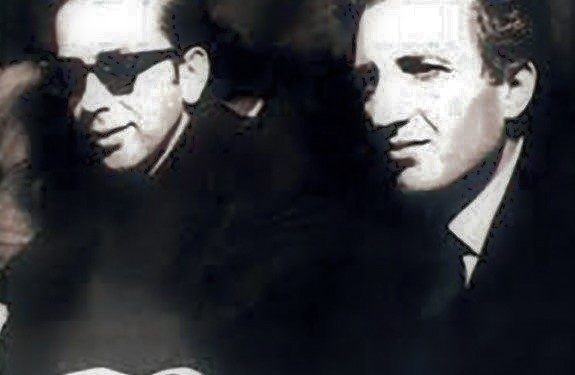Dashnor Kaloçi
Memorie.al publishes an archival document issued by the Central State Archive in Tirana (fund of the former Central Committee of the ALP), which belongs to 1965, where are the minutes of the meeting of the XV Plenum The Central Committee of the ALP which was dedicated to art, culture and literature, where after the report of the Politburo held by Ramiz Alia, the closing speech was given by Enver Hoxha, where among other things, after raising a series of problems that were noticed in the development of literature, arts and culture, giving concrete examples, he praised the work and works of some writers and artists such as: Dhimitër Shuteriq, Shevqet Musaraj, Llazar Siliq, Jakov Xoxa, Sterjo Spasses, Kole Jakova, Nonda Bulka, Ismail Kadare, the artistic works of Tish Daia, Kristo Konos, Cesk Zade, Odise Paskali, Janaq Paços, Nexhmedin Zajmi, Vilson Kilica, Guri Madhi, etc. What did the communist dictator say about the young poetess who complained to him that her books were not published as well as the well-known composer, his old friend from his youth in the city of Korça, who in his work the last one he had sent to Enver was inspired by Greek mythology…!
Excerpts from Enver Hoxha’s speech at the closing of the XV Plenum of the Central Committee of the ALP, on October 26, 1965, dedicated to the art of culture
Dear friends. I was thinking to speak or not to speak in this meeting and this reluctance was caused because in the report of the Politburo, which was kept by comrade Ramiz, as well as in the very good and mobilizing discussions of the comrades, the big problems that concern us today were solved , decomposed in a multifaceted way and with an in-depth Marxist-Leninist analysis. So what I am going to say will not have any more special significance than what you said. However, let me reiterate some thoughts that were expressed either in the report or in the discussions. In one of his writings Marx says: we will not go before the world as doctrines with a new ready principle: here is the truth, kneel before it! – We develop new principles for the world that we derive from its principles. We do not say to the world: “Stop the war; your whole war is idle work “, we give her the real slogan of the war. We only show the world why it really fights, while conscience is something the world has to win, whether it likes it or not. ” These words of Marx should also inspire us in the development of literature, arts and culture in general.
To be a writer or a poet does not mean to have only a tendency, to connect phrases with fantasy or to create verses with rhyme or without rhyme, it is not enough just to have a special school, where you have learned the art and technique for this mastery. Jo! I think that is not enough. You cannot become a real writer just because you have a tendency, and this tendency, this tool, you do not develop by learning, you do not carve, you do not try and you do not beat it in the great anvil of the people and you do not study much and in turn seen social and economic sciences. Only in this way will writers give the working class of the peasantry works worthy of them. I said that writers and artists should study science, but where can we find these scientific works to study, can they say? Everything is not ready and prepared with us. Many things are well prepared or with mistakes, others should be studied and written, should be studied even while preparing the novel itself. Many facts and documents exist, not only of our National Liberation War and the construction of socialism, but also of the times of pre-liberation. Only that these should be sought, studied and exploited by all and not in a fantasy way, but scientifically. Not to say easily “I lived these, so I know and I do not need to refer to the documents”, or “these were told to me by the old woman by the stove and I can imagine the past life of our people”.
We made the revolution, now we are building socialism, but the past, in various forms, weighs on our shoulders. To combat the negative effects of the past, we must explain to the younger generation both the origin and the reasons that led them to develop. Fathers and our generation have lived those situations, but others have not. However, in this regard we do not have the white sheet. Several valuable novels have been written about the time of the liberation. In the novels of the socialist era one can also speak of the past tense. We should not neglect these periods and enrich our literature and arts. Literature and art reflect social relations. This has been true at all times, from Homer and the Greek society of that time to capitalism, from the Enlightenment to Gorky, Mayakovski and the Great October Revolution. This path is also followed by our new literature and art, national in form and socialist in content. Many beautiful, realistic works have come out of the hands of our people. Novels and writings of Dhimitër Shuteriq, Shevqet Musaraj, Lazar Silic, Jakov Xoxa, Sterjo Spasses, Kole Jakova, Nonda Bulka and Ismail Kadare; The artistic works of Tish Daia and Kristo Konos, Cesk Zade, Odise Paskali and Janaq Paço, Nexhmedin Zajmi, Vilson Kilica and Guri Madhi and dozens of others in these categories, to whom I apologize for not mentioning them, are valuable works for us great, educational, inspiring. When he sings, hears or sees them, he sees and feels the pulse of life and war of our people.
Their talent and that of hundreds of others is developing successfully and goes hand in hand with their efforts to learn, to study, to connect with the people. A great inspiration is pushing forward a wonderful new generation of writers and artists who are affirming, becoming loved by the people. Our party, with its work and education from its mother, to protect, educate, encourage by all means these young people. We need to encourage new talent, otherwise we would be wrong; but young talents, without cutting off their momentum, must be educated in the right way. Teach them not to think about why they wrote two poems. I will tell you an incident. In a newspaper of a house of culture I sang a few years ago some simple poems of a young girl, teacher. I said to myself: her poems are not without ideas. I lost sight of it, but a few months ago I received a letter from her, the tone of which seemed to me very abducted and arrogant towards the Publishing House, towards the people of education, who allegedly do not publish his “works” for ambition etc. I thought, the young man is young, we can forgive the kidnapping, and I advised my friends to bring him closer, to clarify, and to help him. Later I received another letter from her, full of nervousness and arrogance for our publishing houses. In a word, she asks almost as if to say “erect a statue”. These are not good, but this is a young girl after all and we should be indulgent; but I am telling you another incident, this time from an old man, who has also been in the war, and has made some poems to the rifle.
These are a few detached verses of no great value, but the enterprise has taken the trouble and published them in a book of 8-10 pages. Someone made a serious critique of this book. This friend has offended us in his poetic “rifle” from this criticism and writes to the Central Committee to take action against the critic, who has made this criticism, he says, out of anger, “why – listen! – when he had a student, he put a bad grade in the draft”! From these and other examples of this kind it must be understood that writing for the people and publishing for the people is one of the most serious and delicate issues. Those who write must take into account Marx’s opinion when he tells Engels. “It has never come out of my hands and will never give anything that is not perfect.” Yes a Marx has come into the world. We just have to feel that when we write about the people, we do a great service, but the people want us to be modest. We must also understand that the Party and the government have set up printing presses and the press, not to publish any cabbage that anyone, even an old man with a good production baggage in the past, can produce, but that has now exhausted and produces Worthless things. Everything should be viewed with a critical eye by critics, publishing companies and other entities, without hatred (because unfortunately, they become hatred). The party and the organs of power must be vigilant.
I think we should not wait for masterpieces to be made, and then printed, in any way, why then did we run out; but also not to use the press by some, which fortunately are few, for financial speculation or to spread ‘ideological confusion or empty works. There are such micro-bourgeois elements, which are pushed to occupy the first places and with their unformed ideological and political baggage or micro-bourgeois distort the ideas of the proletariat. Engels severely criticized Karl Liebknecht for allowing such people to infiltrate the party and its press. Let us not think that we have escaped from these sick people. We need to heal them in the right way and not by rubbing our arms. Marx said: “The writer, of course, must earn money to live and write, but in no case to live and write to make money.” And from these last sick not to think we have escaped. We too need to heal them and teach them to walk uprightly. The Party’s policy in the field of art and literature has been and is clear to all. It will continually and vigorously support good deeds, rightly inspired deeds, those that educate, that mobilize, and that open up perspectives. Mistakes are made and will be made, as is the case in every work, they must be corrected, criticism must be constructive and not denigrating, and the critic must react not with the micro-bourgeois conscience, which holds in itself all evils, but with an open heart.
The party has a duty to patiently correct those who are distorted in their works from the ideological, political, artistic, content or form point of view. I agree with the criticisms that were made in the right spirit and with good intentions for two or three dramas and any prose or poetry. I know that their authors have honestly admitted their mistakes and I am sure they will not repeat them. I have this conviction, because they are sons of the Party, to whom the Party owes its allegiance, because they are talented writers determined to serve their people in the way of building a socialist society and culture, and their mistakes can to be called random. The party will take care of them; will shake their hand as always. Yes, when someone likes to produce things that no one needs, wrong and without salt, he does not have to cry from the Party; she will neither publish nor sell it. Whoever wants let him continue to produce for his closet and we will not bother him until it has become socially dangerous to develop in our country, there are no two morals, but only one, the proletarian morality of the working class. The ideas expressed in the works must conform to this morality. A work empty of ideas and stripped of this morality may present in some cases and for some value in terms of artistic mastery, but from the ideological-social point of view it can have no value. We must therefore always keep in mind that taking a stand in literature and art is part of the political struggle waged by our Marxist-Leninist Party in full unity of thought and action with its people.
In the report and in the discussions, there was a lot of talk about folk music, about folklore. I will not dwell on these important issues and the principles that should guide us in our work, but I will emphasize a few thoughts. Folklore should not be closely identified with folk music. Folklore is not just folk music, music is an expression or a performance of it. Folklore is very broad, as is the life of the people. Folklore is the song, lahuta, flute, drum, labçe song, myzeqarçja, devolliçja, dibrançja. shkodrançja etc. On the other hand, neither folklore, folk poems, folk tales, nor weddings, mourning, joys, sorrows, nor their colorful costumes, their various cuts and stitches, nor popular handicrafts with their national tastes, are separated from folklore. customs are also not shared, written and unwritten, etc., etc. If we do not understand this issue in this way, I think, we can do everything to preserve folk music, but we cannot achieve this if we have broken the foundation. In order to preserve folk music, the base or the main parts of this base must also be preserved. Improving folk music should go hand in hand with improving its base. More concret. We know how all our great folklore has been developed and enriched. Whole books must begin to be written, for he is an invaluable treasure. We have set up a Folklore Institute and we think everything is over. The institute works, as well as the valuable things it has collected, it is rare for those who study them to take root, not to mention the music and art schools, whose programs, if I am wrong very little is said about our folklore and almost only about classical and modern music.
What happens in most cases? The banal poems of some poets that Dritëro Agolli rightly hit with a whip in an article of “Zëri të popullit”, are preferred by our musicians and they make music on them. If someone tells them to take a look at Uncle Selimi’s folk poems from Brataj, they may laugh with irony, they may even make fun of you and say “this is not in it”. But the people themselves have put them in music and have sung for centuries the poems of uncle Selimëve, those poems that in principle you allegedly “boast”, but in reality despise. There is no coherence here otherwise say, do differently. By that I do not understand that you should not make beautiful new poems and put them to music. Let’s take the issue of musical instruments. On the one hand there is talk of beauty, of the variety of folk music, but on the other hand, the houses of culture were filled with accordions, guitars, mandolins and in them, and especially in the people, you find a little insult, garnet, defe, drum, lahuta, bagpipes, etc., with which the people have sung, which are a great basis of folk music. I am not at all against new instruments and against new and better music, on the contrary, but I am also for old instruments; even these to be produced and distributed to the people, because with them the people have sung over the centuries the joys and sorrows, the wars that he has made and wants to sing and will continue to sing in them. Such an unjust action has brought its consequences. New instruments have spread modern songs, for which I am not against, but intentionally or unintentionally, there is a risk that they will gradually avoid folk songs and this would be a big mistake.
They have spread European dances, with which I am not against them, if they are danced en masse, but not to eliminate folk dances, why this would also be a big mistake. The people we take out of school and send them to homes and houses of culture, we teach them to organize modern choirs and some standard things, but to inspire employees to sing popular, even when they are alone. whether at work, to sing two by two and head to head, as our people are accustomed to, no, this is not taught to them, it is even completely forgotten that this people loves, does, that it is his life that he asks, are his traditions and customs. Folk dances and songs have jokes and unity with jokes, with great humor, with costumes. But we are eradicating them little by little, forgetting the jokes and popular humor, putting these costumes in museums and, what is worse, administratively, with orders and campaigns. (I am not talking about allaturka tumans, which are not national and should be put in museums or at the bottom of chests, or about the ugly ancient panties worn by women in some provinces.) The party has rightly said not to be wasteful spending on folk costumes, people go to work in simple costumes. But what spoils us the desire of a girl, that, when she gets married, she will wear a beautiful folk costume or a dibran to wear a pair of turbans? It does not spoil our work, on the contrary, it corrects us, because it preserves our traditions. We are not ashamed of our national costumes, on the contrary, we are proud of them, they are beautiful. Yes he will be spent, they say. This is his job. Let him calculate his budget, after all, why would we fix it?
The party has advised against spending large sums of money on funerals, weddings, dowries and other life shows. This is a fair guideline, but in many cases it is misunderstood and misused. What has this got to do with folklore? – they may ask me. There are many, because, in these important events in human life, our folklore has developed richly, our customs have developed. There are also bad habits in this chapter, the elimination of which the Party has given instructions, but not to stop the good habits of the people. Giving advice not to spend too much, when a person marries the boy, it is right, if you instruct how much he should invite or advise him not to call some of his close friends, to enjoy, to sing and jump, this is wrong. Fighting the idea of dowry for the girl, as it was understood and practiced in the past, is very fair and this fight should continue, but to stop the parent from making her two pairs of clothes, a bed and something else, this is not is right. But, in this last case, when these are advertised with fuss and incite the feelings of every girl to bring peace to her husband, that otherwise he does not take it, as happened in an ugly case in Korça, this must be fought. But how are these evils fought between the -very good habits of our people? With administrative measures? Jo! They are fought with educational work and good examples, with measured actions towards various life performances. Evil can be fought through our own multifaceted folklore. People have a lot of humor in their songs, they make a lot of subtle and cute jokes that make you laugh, but also educate. Estrads could do a lot in this regard. The party has set up variety shows in every district, which are attended by tens of thousands of people. They do their job by limping a lot, not only through the fault of the actors and their directors, I think, who are young, but also through the fault of our writers. These, it seems, despise this wonderful genre that people love.
There are some talented writers in this genre, but they prefer to develop a “cult of their own person”, they prefer to do: a novel – “heavy by weight”, than to educate hundreds of thousands of people a day with small educational, entertaining parts, with high morale for many troubles and problems that concern the people and the Party. These writers tried to make volumes and sometimes these volumes are not sung by anyone, but even if they are sung by far fewer people than they do, every night on our stage. Here, too, there were comrades who criticized our bodies for buying films abroad, in capitalist countries. Those who choose films are party people, no doubt they can make even greater efforts for even better choices, to bring films as suitable for our audience. But, after all, what can you expect from a film, even a progressive one, shot in capitalist countries? What do we do? Stay without movies, enjoy just one movie a year, and bring in lots more from abroad? You, comrades, who criticize do not do wrong, but you also have to make a turn and with your ability to enliven the variety shows, theaters, ballets, choirs, etc., with beautiful national repertoires, for the people to enjoy, have fun, enjoy , to be educated, so that, when he comes to watch a western film, he will be able to judge the morality of this film. Memorie.al





